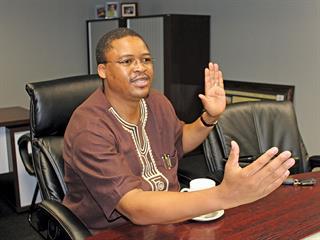
What is your vision for the province?
We want to revive rural economies quite aggressively, using agriculture and rural development as catalysts to turn the situation around. Agrarian transformation is about consolidating the skills base, not just going to the land to plough. The Eastern Cape must take agriculture to the people. We wish to create a province that can export food, in which people can derive commercial value from this important sector.
How do you plan to address the issue of the agricultural value chain in the province?
A total of 17 500ha were planted to maize in the last financial year [by farmers on provincial government-assisted programmes]. This yielded 66 000t, but there are no maize storage facilities, packing facilities or cold rooms on most of these farms. We want to establish dynamic links with Afgri, as they’re the major owner of maize silos in the country, including in our own province. Silos with a capacity of 2 500t are being built in Mqanduli. We’re also in the process of procuring farm equipment such as tractors, sprinklers and weighbridges for [emerging farmers receiving department support]. I’ve also budgeted R9,2 million for a packing shed for a citrus project in Peddie.
In what other ways are you assisting emerging farmers to access markets?
They must start to penetrate the market.The State is the [biggest] market because it is the major procurer of foods and services in South Africa. In the Eastern Cape, approximately R1 billion (from the National Treasury) is earmarked for a school nutrition programme. Food will be served at almost 5 000 schools a day, so that R1 billion will circulate amongst those particular farmers.
We also have hospitals and clinics in the province. Who is supplying them eggs, spinach and so on?
There’s a problem of laxity and ‘business as usual’ in the province. I know of some emerging farmers who are now saying, ‘I was working for government but I have resigned to focus on my farm’. On the issue about who is emerging and who is commercial, I think we need patience. Commercial farmers have been farming for 100 years – farmers have grown up on farms with their families. You need to understand the whole agribusiness.
How are you addressing challenges on the land reform programme?
People must understand that the amount of land doesn’t grow, only the population does. People also think that farming is easy and means ‘quick cash’. There are serious allegations that when government visits these land reform farms for inspection and cost discussion, the owners strip them of assets after the transaction is finalised. Now that we’ll have the valuer-general, we believe he must be the final arbiter on the price [of farms]. Conflict and mediation ought to be handled better by government departments such as water affairs, agriculture and so on.High electricity prices are a killer for emerging farmers. They must invest in green energy to ensure their farms stay competitive.
What kind of technical support does your department provide for emerging farmers?
Farmers can attend engagement sessions with our directorate to learn many things, why, for example, one cultivar
is used rather than another, what values can be derived from the various cultivars, what kind of fertiliser is required, at what rate it should be applied, and so on.
Phone the MEC’s spokesperson for Eastern Cape Rural Development and Agrarian Reform, Mvusi Sicwetsha, on 082 955 8833.












